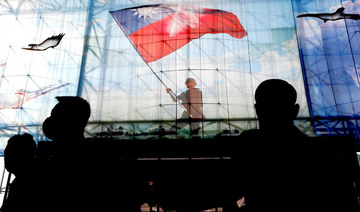WARSAW/SOFIA/KYIV: Europe should stop depending on Russia for trade after Moscow halted gas supplies to Bulgaria and Poland for not paying in roubles, Ukraine said, as the shutoff exposed the continent’s weaknesses and divisions on Wednesday.
The decision, denounced by European leaders as “blackmail,” comes as Russia’s own economy wilts under sanctions and Western countries are sending more arms to Kyiv despite warnings from the Kremlin to back off.
Gazprom, Russia’s gas export monopoly, suspended gas supplies “due to absence of payments in roubles,” as stipulated in a decree from Russian President Vladimir Putin that aims to soften the impact of sanctions.
“The sooner everyone in Europe recognizes that they cannot depend on Russia for trade, the sooner it will be possible to guarantee stability in European markets,” Ukrainian President Volodymyr Zelensky said late on Wednesday.
While the president of the European Commission said Gazprom’s move was “yet another attempt by Russia to use gas as an instrument of blackmail,” EU member state ambassadors asked the executive for clearer guidance on whether sending euros breached sanctions.
France will host a meeting of EU energy ministers on May 2 to discuss how to deal with Russia’s move.
Kremlin spokesperson Dmitry Peskov said Russia remained a reliable energy supplier and denied it was engaging in blackmail.
He declined to say how many countries had agreed to switch to paying for gas in roubles but other European customers said gas supplies were flowing normally.
On the battlefield, Ukraine reported that Russian troops had made gains in the east.
Russia reported a number of blasts on its side of the border, and a blaze at an arms depot. Kyiv called the explosions “karma.”
Ukraine said Russian forces had used tear gas and stun grenades to disperse a pro-Ukraine rally in Kherson, the first big city it has seized. A series of powerful explosions caused by rockets hit the center of Kherson late on Wednesday, Ria News agency reported.
The invasion of Ukraine has reduced towns and cities to rubble, and forced more than 5 million people to flee abroad in a conflict that has prompted fears of wider conflict in the West, unthought of for decades.
Moscow calls it a “special operation” to disarm Ukraine. Kyiv and its allies call the war an unprovoked act of aggression.
With so many EU members reliant on Russian energy, the European Commission has said the EU’s gas buyers can engage with Russia’s payment scheme provided certain conditions are met.
Germany’s main importer, Uniper, said it could pay without violations. Austria and Hungary, among others, have also indicated they will take this route.
Bulgaria and Poland, former Soviet-era satellites that have since joined the EU and NATO, are the only two European countries with Gazprom contracts due to expire at the end of 2022, which meant their search for alternatives was under way.
Warsaw has been one of the Kremlin’s most vocal opponents over the war.
Bulgaria has long had warmer relations with Russia, but Prime Minister Kirill Petkov, who took office last year, has denounced the invasion. He was due in Kyiv on Wednesday to meet Zelensky.
The cut-off comes as the weather turns warmer and the need for gas heating dwindles. Poland says it has ample gas in storage, and Bulgaria is seeking supplies from Greece and Turkey.
But if the cut-off lasts for many months or spreads to other countries, it could cause havoc.
Germany, the biggest buyer of Russian energy, hopes to stop importing Russian oil within days, but weaning itself off Russian gas is a far bigger challenge.
Economy Minister Robert Habeck said a Russian energy embargo or blockade would tip Germany, Europe’s largest economy, into recession.
A Russian economy ministry document indicated that Russia’s economy could shrink by as much as 12.4 percent this year.
Since the Russian invasion force was driven back at the outskirts of Kyiv last month, Moscow has refocused its operation on eastern Ukraine, starting a new offensive to fully capture two provinces known as the Donbas.
Blasts were heard early on Wednesday in three Russian provinces bordering Ukraine, authorities said, and an ammunition depot in the Belgorod province caught fire.
Kyiv has not confirmed responsibility for these and other earlier incidents, but has described them as payback. “Karma is a cruel thing,” presidential adviser Mikhaylo Podolyak wrote on social media.
An aide to the mayor of the ruined port city of Mariupol said Russian forces had renewed their attacks on the Azovstal steel plant, where fighters and some civilians remain holed up.
Concern has increased over the prospect of the conflict widening to neighboring Moldova, where pro-Russian separatists have blamed Ukraine for reported attacks this week in their region, occupied since the 1990s by Russian troops.
Authorities in Transdniestria said there had been firing across the border from Ukraine on Wednesday.
Ukraine has accused Russia of trying to mastermind ‘false flag’ attacks in the region, and Moldova’s pro-Western government accuses the separatists of trying to stir conflict.
Stop relying on Russia, Ukraine warns Europe after gas shutoff
https://arab.news/rfcz6
Stop relying on Russia, Ukraine warns Europe after gas shutoff
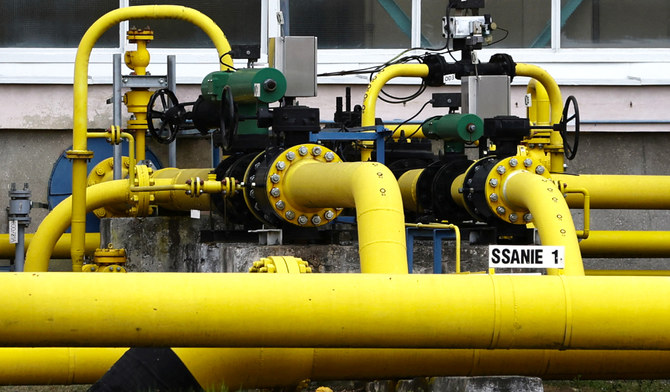
- EU denounces gas cut-off as 'blackmail'
- Russia demands payment in roubles to shield it from sanctions
Egypt takes key role in renewed diplomatic push for truce in Gaza
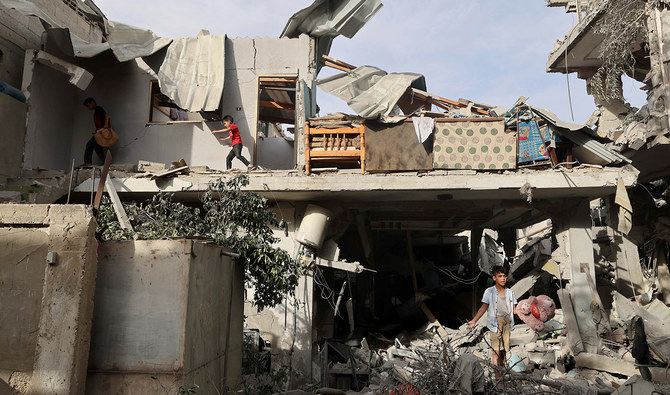
- Officials in Israel described latest moves as ‘an attempt by Egypt to restart the talks’ after Qatar mediation efforts broke down
- Egyptian intelligence chief Abbas Kamel to make clear ‘will not tolerate’ Israel’s deployments of troops along Gaza-Egypt border
CAIRO: A high-level Egyptian delegation was in Israel for talks on Friday amid a new diplomatic push for a truce in the Gaza war and the release of Israeli hostages held by Hamas.
The visit followed a trip to Cairo on Thursday by Israeli army chief Lt. Gen. Herzi Halevi and Shin Bet domestic intelligence service head Ronen Bar.
Officials in Israel described the latest moves as “an attempt by Egypt to restart the talks” after previous mediation efforts led by Qatar broke down. They told the Egyptian delegation that Israel was ready to give hostage negotiations “one last chance” to reach a deal before moving forward with an invasion of the southern city of Rafah.
“Israel told Egypt that it is serious about preparations for the operation in Rafah and that it will not let Hamas drag its feet,” one official said.
FASTFACT
34,356
Palestinians have been killed in the Gaza Strip during more than six months of war between Israel and Hamas.
Egypt is concerned about a potential influx of Palestinian refugees from Gaza if the war continues with the long-threatened Israeli offensive into Rafah, and has taken an increasingly active role in the negotiations.
“The Egyptians are really picking up the mantle on this. Egypt wants to see progress, not least because it’s worried about a prospective Rafah operation,” the official said.
Israel was increasingly looking past Qatar as a main broker, according to the official, after it failed to respond to Israeli demands to expel Hamas leaders from its territory or curb their finances.
“Qatar is still involved but in a lesser capacity,” the official said. “It’s clear to everyone they failed to deliver, even when it came to expelling Hamas or even shutting down their bank accounts.”
Hamas officials said they still considered Qatar a key mediator, alongside Egypt.
White House national security adviser Jake Sullivan said he saw fresh momentum in the talks.
“I believe that there is a renewed effort … to try to find a way forward,” he said “Do I think that there is … new life in these hostage talks? I believe there is.”
No new proposals
An official, who spoke on condition of anonymity, said Israel had no new proposals to make, although it was willing to consider a limited truce in which 33 hostages would be released by Hamas, instead of the 40 previously under discussion.
“There are no current hostage talks between Israel and Hamas, nor is there a new Israeli offer in that regard,” the official said. “What there is, is an attempt by Egypt to restart the talks with an Egyptian proposal that would entail the release of 33 hostages — women, elderly and infirm.”
According to Israeli media reports, Israeli intelligence officials believe there are 33 female, elderly and sick hostages left alive in Gaza, out of a total of 133 still being held by Hamas and other Palestinian militant groups.
There was no decision on how long any truce would last but if such an exchange were agreed, the pause in fighting would be “definitely less than six weeks,” the official said.
The visit by the Egyptian delegation came a day after the United States and 17 other countries appealed to Hamas to release all of its hostages as a pathway to end the crisis in Gaza. Hamas vowed not to relent to international pressure.
Hamas said it was “open to any ideas or proposals that take into account the needs and rights of our people.” However it stuck to central demands Israel has rejected, and said it criticized the statement for not calling for a permanent ceasefire and the withdrawal of Israeli forces from Gaza.
Taiwan reports Chinese military activity after Blinken leaves Beijing
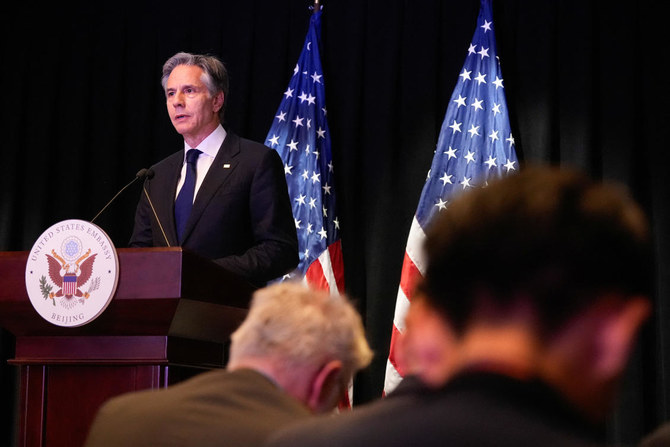
- US Secretary State Antony Blinken has stressed the ‘critical importance’ of maintaining peace and stability across Taiwan Strait while in China
TAIPEI: Taiwan reported renewed Chinese military activity near the island on Saturday with 12 aircraft crossing the sensitive median line of the Taiwan Strait, a day after US Secretary State Antony Blinken ended a visit to China.
The United States is Taiwan’s most important international supporter and arms supplier despite the absence of formal diplomatic ties. Blinken said he had stressed the “critical importance” of maintaining peace and stability across the strait while in China.
Democratically governed Taiwan has faced increased military pressure from China, which views the island as its own territory. Taiwan’s government rejects those claims.
Taiwan’s defense ministry said that from 9:30 a.m. (0130 GMT) on Saturday it had detected 22 Chinese military aircraft, including Su-30 fighters, of which 12 had crossed the median line to Taiwan’s north and center.
The line once served as an unofficial border between the two sides over which neither sides’ military crossed, but China’s air force now regularly sends aircraft over it. China says it does not recognize the line’s existence.
Taiwan’s defense ministry said the aircraft were involved in “joint combat readiness patrols” with Chinese warships, adding that Taiwanese aircraft and ships responded “appropriately.” It did not give details.
China’s defense ministry did not answer calls seeking comment outside of office hours on Saturday.
Taiwan’s armed forces are well-equipped and well-trained but dwarfed by those of China’s, especially the navy and air force, which respond almost daily to Chinese missions.
China considers Taiwan the most important issue in its relations with the United States, and Beijing has repeatedly demanded Washington end weapons sales to Taiwan.
Taiwan President-elect Lai Ching-te takes office on May 20 after winning January’s election. Beijing considers him a dangerous separatist and has rebuffed his repeated calls for talks.
Lai said on Thursday that China should have the confidence to talk to Taiwan’s legally elected government. Like outgoing President Tsai Ing-wen, Lai says only Taiwan’s people can decide their future.
Pakistan gears up for PM Sharif’s visit to China in May
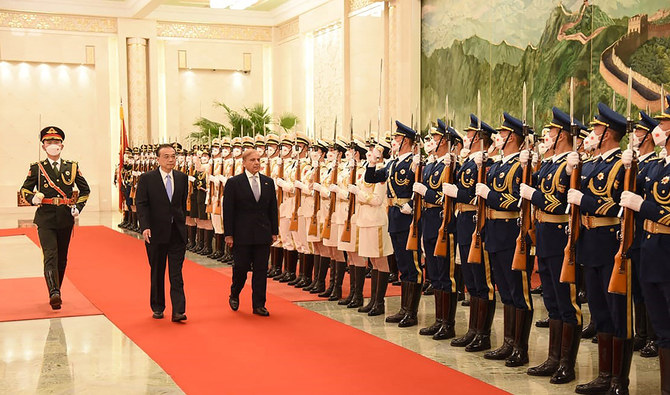
- Planning minister says China has invested $25 billion in infrastructure projects in Pakistan since 2013
- However, the undertaking has been affected by Pakistan’s financial woes, attacks on Chinese in recent years
ISLAMABAD: Pakistan is preparing for a possible visit by Prime Minister Shehbaz Sharif to China next month and the 13th meeting of a joint cooperation committee (JCC) on the China-Pakistan Economic Corridor (CPEC), the Pakistani planning ministry said on Friday.
The statement came after Planning Minister Ahsan Iqbal presided over a meeting with regard to the prime minister’s visit and preparations for the 13th JCC meeting.
Sharif is expected to visit China in May to restore Beijing’s confidence in Islamabad with regard to various Chinese-funded projects, Pakistani state media reported this month, citing a senior official.
“The federal minister said that the prime minister’s visit to China will be of great importance and China wishes that the 13th JCC [meeting] is held before this visit,” the Pakistani planning ministry said in a statement.
“So that projects, including five new economic corridors, can be accelerated and the desired results can be obtained from the visit.”
Beijing is investing over $65 billion in energy and infrastructure projects in Pakistan as part of CPEC, a major segment of Beijing’s Belt and Road infrastructure initiative, which will connect China to the Arabian Sea and help Islamabad expand and modernize its economy through a network of roads, railways, pipelines and ports in Pakistan.
Since its initiation in 2013, CPEC has seen tens of billions of dollars funnelled into massive transport, energy and infrastructure projects. But the undertaking has also been hit by Pakistan struggling to keep up its financial obligations as well as militant attacks on Chinese nationals in Pakistan.
From 2013 to 2018, Iqbal said, China invested $25 billion in Pakistan under CPEC that improved economic condition of the country.
He said his government was currently taking steps to implement CPEC projects and was determined to soon complete them.
Green glamor: Young Pakistani innovators transform electronic waste into fashionable jewelry

- Jewelry crafted from electronic scrap appeals to a young demographic that values innovation, ethical lifestyle choices
- Sameer Asif began to pursue entrepreneurial dream by partnering with a classmate to launch ‘Wired Wonders’ in 2023
ISLAMABAD: In a room filled with discarded computer components and broken electronic items, 21-year-old Sameer Asif works under a bright fluorescent light, meticulously shaping an old motherboard into a heart-shaped pendant.
His project is more than a hobby; it’s the core of his entrepreneurial dream, “Wired Wonders,” a venture launched in 2023 to transform electronic waste into wearable art.
Jewelry crafted from electronic scrap aligns with a global trend in sustainable fashion, appealing to a young demographic that values innovation, individuality and ethical lifestyle choices.
Despite its niche market appeal, this form of jewelry reflects a growing interest in repurposing materials that would otherwise contribute to landfills, offering a creative solution to the challenge of electronic waste.
For Asif, however, the whole thing began as an accident.
“I was always into arts and crafts as a child,” he told Arab News in a conversation this week. “I enjoyed giving handmade things, and the first-ever necklace I made from a motherboard was also a gift for my friend.”
“She wore it to the university, and people started asking her about it,” he continued. “That’s when we thought this could actually become a business since people were interested in it.”
Asif said he was fascinated by electronics since childhood, using his tools to dismantle sophisticated gadgets to understand how they worked.
“When I was like five or six years old, on my birthday, someone gifted me a toy set of mechanical things,” he recalled. “It had nuts and screws, and it came with a screwdriver. I used that screwdriver to open my brother’s PlayStation 2 which he really loved.”
“I just opened it but couldn’t fit it back,” he recalled with a smile, saying his brother and parents were not pleased with him.
Asif partnered with his friend Maham Usman to launch Wired Wonders, asking her to manage the social media, sales and marketing.
Asked about the challenges of developing a small niche business, Usman said the biggest problem was procuring discarded motherboards that were not readily available.
“There are like one or two scrapyards in Rawalpindi where they sell discarded electronics in bulk,” she said. “To tackle this challenge, we have started a recycling initiative where we ask people to donate the electronic devices they want to dispense with. Not only will this help us with business, but it is also good for the environment.”
Making a single piece of jewelry can take about two hours. The process involves cutting and shaping motherboard pieces, removing the sharp edges and then pouring resin – a transparent, viscous liquid – over it for shine and preservation. Thereafter, the piece is left to dry for 24 hours.
Asked about the prices of their products, the Wired Wonders’ team informed that they ranged from $1.40 to $7.
“The gold and copper in motherboards add unique value to our jewelry,” Usman said.
China unveils first Hangor-class submarine developed for Pakistan
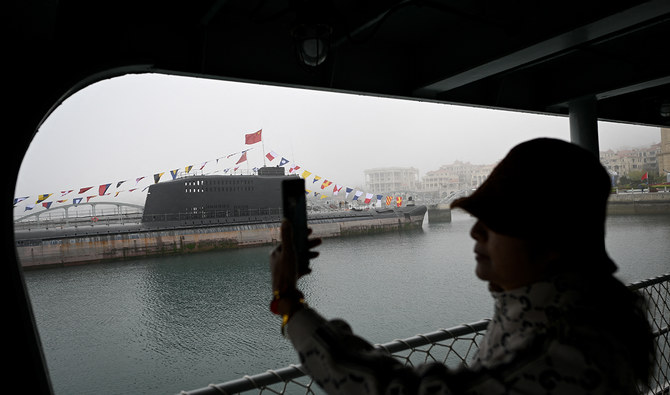
- Islamabad signed agreement for the acquisition of eight submarines during President Xi’s visit to Pakistan
- Under the contract, four submarines will be built in China, while other four will be built at Karachi Shipyard
ISLAMABAD: China on Friday unveiled the first Hangor-class submarine that it has developed for Pakistan, the Pakistani military said.
The Pakistani government had signed an agreement with Beijing for the acquisition of eight Hangor-class submarines during the visit of Chinese President Xi Jinping to Pakistan.
The first of these submarines was launched at a ceremony held at Shuangliu Base in China’s Wuhan, which was attended by Pakistan’s Chief of the Naval Staff Admiral Naveed Ashraf as the chief guest, according to the Inter-Services Public Relations, the Pakistani military’s media wing.
“Under the contract, four submarines will be built in China while the other four will be built at Karachi Shipyard and Engineering Works Limited in Pakistan,” the ISPR said in a statement.
“These submarines will be equipped with advanced weapons and sensors to target long-range targets.”
The ISPR said the project would add a new dimension to Pakistan-China friendship. China has been one of Pakistan’s most trusted friends and both countries have worked on a number of joint projects in the field of defense in recent years.
Besides, Beijing is investing over $65 billion in energy and infrastructure projects in Pakistan as part of China-Pakistan Economic Corridor (CPEC), a major segment of its Belt and Road Initiative designed to give China a shorter, more secure trading route to the Middle East and beyond, while also boosting Pakistan’s economy.
Since its initiation in 2013, CPEC has seen tens of billions of dollars funnelled into massive transport, energy and infrastructure projects. Beijing has also often provided financial assistance to bail out its often-struggling neighbor in times of a financial crunch.



